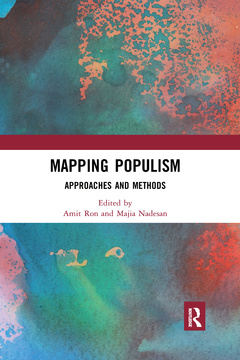Description
Mapping Populism
Approaches and Methods
Coordinators: Ron Amit, Nadesan Majia
Language: English
Subjects for Mapping Populism:
Keywords
Occupy Wall Street; Vice Versa; populism; Direct Democracy; mapping; Violated; studying; Chronic; understanding; American Populist Movements; approaches; Follow; methods; Populist Leaders; methodologies; Left Wing Populism; assumptions; Populist Rhetoric; mobilizations; Populist Party; theories; Populist Discourse; meanings; Corruption Talk; effects; Collective Political Subject; Populist Parties; Tea Party Movement; Cas Mudde; Populist Entrepreneurs; Lebanese Communist Party; Rainbow Coalition; Progressive Socialist Party; Plebeian Politics; Single Member Districts; Social Science Research; Welfare Chauvinism
Publication date: 09-2021
· 15.6x23.4 cm · Paperback
Publication date: 03-2020
· 15.6x23.4 cm · Hardback
Description
/li>Contents
/li>Readership
/li>Biography
/li>
This collection, which can serve as an introduction to the field of populism, provides an array of interdisciplinary approaches to populist mobilizations, theories, meanings, and effects. In so doing, it rejects essentialized ideas regarding what populism is or is not. Rather, it explores the political, social, and economic conditions that are conducive for the emergence of movements labelled populist, the rationalities and affective tenor of those movements, the political issues pertaining to the relationship between populists and elites, and the relationship between populist groups and political pluralism. Grappling with accord and discord in assumptions and methodologies, the book will appeal to scholars of sociology, political science, communication and cultural studies interested in populism, social movements, citizenship, and democracy.
Introduction Part 1: Explaining Populism 1. Explaining Populism Introduction 2. Populism & Citizenship 3. From Personal Opinion to Social Fact 4. The People and the Public Part 2: Populism and Pluralism 5. Populism and Pluralism Introduction 6. Democratic Populism as Constructive Nonviolence 7. Lessons from the Original Rainbow Coalition 8. Populism, Pluralism, and the Ordinary Part 3: Populism and Its Conditions of Possibility 9. Populism and Its Conditions of Possibility Introduction 10. Does Globalization Produce Populist Parties? A Cross-National Analysis 11. Populism, Monopoly, and the Urban Liberal-Rural Populist Coalition 12. Farming Failure: The Origins of Rural Trumpism, 1950-2016 13. Austerity and Ethno-nationalism 14. Populism and War-making Part 4: Between "the People" and Elites 15. Between "the People" and Elites People Introduction 16. The Social Psychology of Populism 17. Populist Corruption Talk 18. Populism, Democracy, and the Ukrainian Uprisings of the Orange Revolution and Euromaidan 19. Twenty-First Century American Populist movements 20. Crisis Government: The Populist as Plebeian Dictator Part 5: Issues and Methodologies 21. Issues and Methodologies Introduction 22. Political Theory and Its Problem with Populism 23. New Directions in Quantitative Measures of Populism 24. Populism from the Bottom Up Conclusion: Emerging Issue and Future Directions
Amit Ron is Associate Professor of Political Science at Arizona State University, U.S.A. His research focuses around two central themes: the political and normative dimensions of the history of political economy, and the democratic theory of the public sphere.
Majia Nadesan is Professor of Communication Studies at Arizona State University, U.S.A. She studies the political logics shaping the government of life, with particular emphasis on the constitution and distribution of risk. Her research has emphasized the government of autism, ability/disability, childhood, democracy, and most recently financial and environmental crises.
These books may interest you

The Oxford Handbook of Populism 49.66 €

The Oxford Handbook of Populism 152.43 €

Democracy, Populism, and Truth 158.24 €

